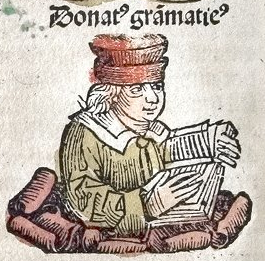Aelius Donatus
Aelius Donatus was a Roman grammarian and teacher of rhetoric who lived during the fourth century AD. His works, particularly on Latin grammar and rhetoric, played a significant role in the education system of the Late Roman Empire and continued to influence the teaching of Latin in the Middle Ages and the Renaissance. Donatus is best known for his two major works: Ars Grammatica, a Latin grammar, and Ars Minor, a shorter version of the same, which were standard texts for the study of Latin during the Middle Ages.
Life[edit | edit source]
Very little is known about the life of Aelius Donatus. It is believed that he lived during the mid-fourth century AD, but details about his birth, life, and death are scarce. He was a contemporary of the famous Roman rhetorician Aelius Aristides, and it is known that he taught in Rome. Among his most notable students was Saint Jerome, who later translated the Bible into Latin, known as the Vulgate.
Works[edit | edit source]
Ars Grammatica[edit | edit source]
The Ars Grammatica of Aelius Donatus is a comprehensive work on Latin grammar. It covers various aspects of Latin grammar, including morphology, syntax, and phonetics. The work is divided into three parts, dealing with the eight parts of speech in Latin, with a detailed analysis of each. This work was highly regarded in the Middle Ages and served as the primary textbook for the study of Latin grammar.
Ars Minor[edit | edit source]
The Ars Minor is a shorter and more concise version of the Ars Grammatica. It was designed as an introductory textbook for young students starting their study of Latin. The Ars Minor focuses on the basics of Latin grammar, including the parts of speech and basic sentence structure. It became one of the most widely used textbooks in medieval schools and was instrumental in the teaching of Latin across Europe.
Legacy[edit | edit source]
The educational works of Aelius Donatus, especially the Ars Grammatica and the Ars Minor, had a profound impact on the teaching of Latin in the Middle Ages. His approach to grammar and his method of teaching were adopted by many subsequent generations of teachers and scholars. The widespread use of his textbooks helped standardize the teaching of Latin and contributed to the preservation of Latin as a scholarly and liturgical language throughout the Middle Ages and into the Renaissance.
Donatus's influence extended beyond the realm of education. His works were among the first to be printed after the invention of the printing press, reflecting their continued importance in education. The terminology and concepts introduced by Donatus in his grammatical works continued to be used in the study of Latin and in the field of linguistics.
Conclusion[edit | edit source]
Aelius Donatus was a pivotal figure in the history of education and the study of Latin. His works laid the foundation for the teaching of Latin grammar and rhetoric, influencing countless scholars and educators over the centuries. Despite the scarcity of information about his life, his contributions to education and the Latin language have ensured his lasting legacy.
This article is a literature-related stub. You can help WikiMD by expanding it!
Search WikiMD
Ad.Tired of being Overweight? Try W8MD's NYC physician weight loss.
Semaglutide (Ozempic / Wegovy and Tirzepatide (Mounjaro / Zepbound) available. Call 718 946 5500.
Advertise on WikiMD
|
WikiMD's Wellness Encyclopedia |
| Let Food Be Thy Medicine Medicine Thy Food - Hippocrates |
Translate this page: - East Asian
中文,
日本,
한국어,
South Asian
हिन्दी,
தமிழ்,
తెలుగు,
Urdu,
ಕನ್ನಡ,
Southeast Asian
Indonesian,
Vietnamese,
Thai,
မြန်မာဘာသာ,
বাংলা
European
español,
Deutsch,
français,
Greek,
português do Brasil,
polski,
română,
русский,
Nederlands,
norsk,
svenska,
suomi,
Italian
Middle Eastern & African
عربى,
Turkish,
Persian,
Hebrew,
Afrikaans,
isiZulu,
Kiswahili,
Other
Bulgarian,
Hungarian,
Czech,
Swedish,
മലയാളം,
मराठी,
ਪੰਜਾਬੀ,
ગુજરાતી,
Portuguese,
Ukrainian
Medical Disclaimer: WikiMD is not a substitute for professional medical advice. The information on WikiMD is provided as an information resource only, may be incorrect, outdated or misleading, and is not to be used or relied on for any diagnostic or treatment purposes. Please consult your health care provider before making any healthcare decisions or for guidance about a specific medical condition. WikiMD expressly disclaims responsibility, and shall have no liability, for any damages, loss, injury, or liability whatsoever suffered as a result of your reliance on the information contained in this site. By visiting this site you agree to the foregoing terms and conditions, which may from time to time be changed or supplemented by WikiMD. If you do not agree to the foregoing terms and conditions, you should not enter or use this site. See full disclaimer.
Credits:Most images are courtesy of Wikimedia commons, and templates, categories Wikipedia, licensed under CC BY SA or similar.
Contributors: Prab R. Tumpati, MD

